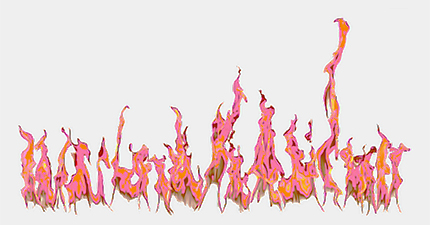In the Netflix docuseries America’s Sweethearts: Dallas Cowboys Cheerleaders, we see a tour group move through Jerry Jones’s AT&T stadium. The tour guide informs the tourists that the stadium breaks the world records for the most number of television screens in a single building. “We have screens in the bathrooms,” he says. “We even have a jail here and, in that jail, is a screen.”
American paranoia isn’t unique but it does have to do with the huge number of screens found all around. American paranoia has to do with the look of things. How things look and appear—recognition and representation.
I grew up in the part of the midwest that went for Ron Paul every year. We didn’t learn American history. We watched reality TV shows where contestants pretended to be early settlers, winning a million dollars if they successfully gathered enough firewood. Around me, people had a lot of mental energy but nowhere to put it all. I heard conspiracy theories almost every single day—Britney Spears uses butterflies in her albums so she must be Illuminati. Madonna made the Freemasons triangle with her fingers. The Chinese are trying to take over the world. Scientists know when the next zombie apocalypse is coming but they’re not telling us. What can you do? You can buy as many guns as possible. I knew a kid in Iowa who had a secret hole somewhere that he filled with guns.
Richard Hofstadtler puts it this way in his essay The Paranoid Style of American Politics which he wrote in 1964: “American politics has often been an arena for angry minds. In recent years we have seen angry minds at work mainly among extreme right-wingers, who have now demonstrated in the Goldwater movement how much political leverage can be got out of the animosities and passions of a small minority. But behind this I believe there is a style of mind that is far from new and that is not necessarily right-wing. I call it the paranoid style simply because no other word adequately evokes the sense of heated exaggeration, suspiciousness, and conspiratorial fantasy that I have in mind.”
Here’s what I observe—American paranoia is about analyzing media spectacle. Did someone blink too fast or too slow? Does a woman have a baby fundy voice or vocal fry and what do either of those things say about her? What does it mean that two or three highly visible people start to use the same buzzwords? If you break a JPG down to its pixels, can you extract a new image?
When I moved to New York, I found that a lot of urban politics are also about optics. There’s too many politicians of color funding jails. So many organizations are focused on making a statement. I worked in nonprofits for a long time. I saw people do fashion photo ops at jails and privately owned museums swindle senior citizens into paying them for their oral histories. In a world where political impact is viewed through the lens of who is watching and marketability, I found myself way too involved in questions about how various statements would make a movement appear.
A lot of people here feel righteous about coming to conclusions about someone else’s actual experience based on their analysis of the media spectacle around that person’s experience. I see people cite statistics without context to each other, trying to prove to people that their own memories must be either wrong or abnormal. The law of the land is that the majority rules so we must care about what “most people” think and see. The phrase “most people” has become a buzzword. In the past, they called it the silent majority.
What is actually going on? What is actually happening? In the land where “most people” talk the loudest, the land of the most television screens, media spectacle feels so dishonest that most of us will definitely freak out now and then. We’ll start to wonder what reality actually is. We’ll start trying to read between the lines. We’ll start looking for buzzwords and patterns they make, and start extracting new images from JPGs.
None of us are immune to conspiratorial thinking. When people feel lied to, we will definitely start to make up our own theories. Unfortunately, a lot of conspiracy theories are motivated by manufactured fear and general sadism. If we are shielded from reality, then we will try to blame our own problems on the same old scapegoats.
America believes in evil—in devils. I went through the public school system that relied on television. Television likes to narrate history through a dichotomy of winners and losers. Some of us win history and some of us lose it. I worked in nonprofits for a long time where we talked about people and institutions in terms of good and bad.
The surveillance structure in the United States is highly developed. Cops have a lot of money and a lot of tools. Cops rely on optics too. You see them everywhere—helicopters flying above us and stationed in the train stations. The Trump administration created a database of immigrants and the Biden administration maintains it. The database is hosted in Amazon’s servers and a secretive AI program scans it, looking for god knows what. Goodness? Badness? Winning or losing?
How entwined are the systems of representation and the systems of surveillance in this place? I’m not sure. Someone is always watching. We call that audience the mass majority. “Most people.”
“Most people” hate queer people for no reason I can comprehend. “Most people” think that Chinese people are brainwashed robots obedient to a totalitarian regime even if they are not Chinese nationals and even if Chinese nationals themselves are as capable of critical thinking as “most people”. “Most people” think that capitalism is run by some evil cabal and that we can solve its moral issues if we promote good business, as if capitalism does not advance itself using imperialism by necessity. “Most people” think that a person from their identity group will be more motivated to represent their interests. “Most people” think that the American settler project is finished.
What emotions are most alive in the phenomenon of American paranoia? Is it greed or sadism? I’m not sure about that either. Capitalism blends into imperialism—guns are an industry. Both greed and sadism must motivate market expansion. Did racism predate capitalism or did capitalism motivate racism? Do these questions even matter? I find myself trying to read between the lines of what “most people” seem to believe and walk away wondering if trying to understand makes any difference at all.
It’s an election year and I’m feeling jaded. Maybe the key is to not worry about what “most people” seem to think. That in and of itself is an appearance. People are much more complicated than the statistics that claim to represent us and more complicated than even what we say. You never know what the future will hold because you never know what people will do. People change. Entire societies change. Screens can be destroyed and, once they are, their images fade.
The images that we see on our screens aren’t prophecies. They don’t tell us what the future will hold or what people will do. The images that we see on our screens are the highly visible politics of those who can afford to put a lot of screens up everywhere. They are the points of assumption where the Jerry Jones of the world think they align with “most people.” In America's Sweethearts, Dolly Parton sings a song about a working class woman while thirty six exploited cheerleaders dance feverishly with her. They dance on indigenous land for thanksgiving in cowboy bikinis. The Jones family keep claiming that they are a global brand even though they own an American football team, a sport that only one country cares about. These are the images that we see on our screens. The idea that they represent the politics and emotions of “most people” is simply preposterous because these images are not even comprehensible.
You can analyze American paranoia for your entire life and you still won’t be able to make sense of it. It doesn’t make any sense in the first place. But in the right time and right place with the right speed, it can create catastrophe very quickly.
1 of 211
>>>


